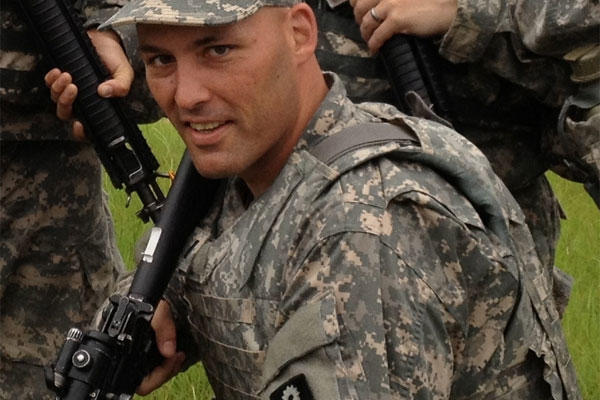SACRAMENTO – Army 1st Lt. Christian Wellisch looks like a bruiser. At 6 feet 2 inches tall, weighing in at 235 pounds, with a square jaw and shaved head, he looks like the kind of guy you don’t want to meet in a dark alley.
In fact, Wellisch knows how to throw a punch and choke you into submission. But there is much more to him than meets the eye.
Wellisch has undergraduate and graduate degrees in philosophy from San Jose State University and a law degree from the McGeorge School of Law. On the civilian side, he has his own law practice, and he teaches an online philosophy course part-time.
He also is the 49th Military Police Brigade’s newest judge advocate general officer. But mixed martial arts aficionados might recognize him as “The Hungarian Nightmare,” a San Jose-based fighter who had a good run in Ultimate Fighting Championship competition.
Though his days in the octagon are now a few years behind him, Wellisch said, he still remembers his first professional mixed martial arts fight vividly. It took place in Hawaii in 2001, when the sport was rising in popularity.
Wellisch entered the cage and squared off with his opponent. “I had never been locked in a cage with another man with both of us bent on destroying each other,” he said. “It was an incredible adrenaline rush.”
He said the glitz and glamour, the lights, the crowd and the cheers were exhilarating. He quickly destroyed his opponent, knocking him out with strikes.
“To win was even more of a rush,” he said.
He had trained long and hard for the fight, and it was all over in about a minute. But he was still pumped to go several more rounds, he said, so he went outside and ran sprints just to burn off his excess energy.
He won about $2,000 that night.
Wellisch is originally from Hungary. His family moved to Austria when he was 12, and then to California when he was 14. He went to high school in Monterey, where he competed on the wrestling team. He went on to wrestle at San Francisco State University, but gave it up after dislocating his shoulder.
“I still think that amateur wrestling is more physically demanding than mixed martial arts,” he said. “It’s just more intense with the constant torqueing of your body, whereas when you’re striking, you’re more relaxed.”
Over the course of his amateur wrestling career, Wellisch cracked a rib, tore a hamstring, broke a foot, broke or cracked all his fingers, had two teeth knocked out and dislocated his shoulder. But during his mixed martial arts career, Wellisch said, he suffered only a broken nose, a dislocated toe and some cuts.
After quitting wrestling, Wellisch left San Francisco State and took a job in the information technology industry in Silicon Valley. He went back to school at San Jose State University and majored in philosophy.
“I couldn’t just sit on my butt,” he said. “I’ve always been competitive and wanted to get back on the mat, so I tried jujitsu. It was not as much torqueing on your opponent as you do in wrestling.”
Wellisch joined the American Kickboxing Academy in San Jose to learn jujitsu. His trainers quickly saw that he had a talent for grappling and suggested that he try fighting.
“Training with the fighters was a learning experience for me,” he said. “I had never been punched by anyone who really knew how to punch before.”
His trainers saw that he had potential.
“They said, ‘Hey, you can make money doing this,’” he said. That led to his first professional fight in Hawaii, which resulted in more fights in the United States, Japan, Mexico and Australia.
In 2005, Wellisch’s training partners Mike Swick, Josh Koscheck and Bobby Southworth appeared in the first season of the reality show “The Ultimate Fighter.” Wellisch was accepted for the show’s second season, but couldn’t participate because of a conflict with his law school finals. Instead, he was offered a contract that led to five professional fights in the UFC.
“There’s really no comparison,” he said of fighting in Las Vegas with the UFC. “They know how to put on a show -- glitz and glamour, pomp and the interviews. You walk into an arena packed with 10,000 people screaming. It’s intense.”
Wellisch said he was earning between $10,000 to $15,000 just to show up for a fight, doubling that when he won.
While fighting for the UFC, Wellisch managed to earn his law degree and a master’s degree in philosophy while teaching philosophy part-time.
In law school, he started a mixed martial arts club mainly for people who liked watching UFC fights. One of the club members was fellow law student Army Capt. Corey Ordonez, a National Guard member. Ordonez convinced Wellisch to join the California National Guard as a JAG officer.
Wellisch said he had considered joining the military in high school. After he talked with Ordonez, he added, the Guard appealed to him, because it allowed him to stay in California and he saw it as being more flexible than the active duty Army.
“The Guard gives the opportunity to serve and the flexibility to do other things,” he said. “Another reason I wanted to join was to continue the routine of physical fitness. Now I have a new motivation to do so.”
After 21 professional bouts, Wellisch retired from the octagon in 2009, finishing out his professional mixed martial arts career with a 13-8 record. He still trains and follows the sport, he said, but his focus now is on his law practice and his new career in the California National Guard.
“I’m happy with what I accomplished fighting in the UFC and getting to see the world on the promoters’ dime,” he said. “I still train and do a lot of grappling and jujitsu that I really enjoy, but no more kicking people in the head and no more getting kicked in the head any more. As far as the civilian world, I’d like to continue teaching part-time and build my legal practice. And I’d like to stick it out with the Guard for the long haul.”




























